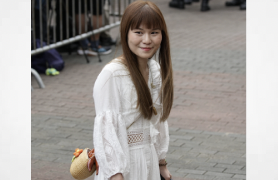Header Image: Clarisse Yeung arrives at Hong Kong’s West Kowloon Law Courts Building to hear her verdict, on May 30, 2024. Photo: Kyle Lam/HKFP.
In a 319-page court document, the judges explained the reasons for their rulings, rebutted a number of the defence’s arguments and called three defendants or the evidence that they gave “unreliable.”
Fourteen Hong Kong pro-democracy figures have been found guilty of taking part in a conspiracy to commit subversion under the Beijing-imposed national security law over their involvement in an unofficial primary election held in July 2020.
After Thursday’s verdict, they now join 31 former lawmakers and activists who earlier pleaded guilty to that charge in awaiting sentencing. The maximum penalty is life in prison, while the minimum sentence – under a three-tier system laid out by the security legislation – is “fixed term imprisonment of not more than three years, short-term detention or restriction.”
Two of the 47 democrats prosecuted in February 2021 – Lawrence Lau and Lee Yue-shun – were acquitted on Thursday, becoming the first two people tried under the security law to be cleared of their charges since it was enacted in July 2020. Government prosecutors soon announced they intended to appeal their acquittal, however.
In a 319-page court document, the judges explained the reasons for their rulings, rebutted a number of the defence’s arguments and called three defendants or the evidence that they gave “unreliable.” The court mainly assessed the defendant’s knowledge of the scheme, whether were party to the scheme, and whether they had an intention to subvert the government.
A ‘lethal constitutional weapon’
The primary poll at the centre of the case, held just weeks after the law came into effect, was designed to help the city’s pro-democracy camp determine which candidates would be best placed to help them win a controlling majority in an upcoming Legislative Council (LegCo) election.
Prosecutors alleged that the democrats saw a legislative majority as a “lethal constitutional weapon“ and intended to abuse the powers conferred to lawmakers by the city’s mini-constitution to indiscriminately veto bills – such as the budget – forcing the chief executive’s resignation and a government shutdown.
During the trial, the prosecution cited three main documents to argue their case against the democrats, including an online declaration known as “Resolute Resistance, Inked Without Regret,” which was signed by 33 defendants who ran in the primary election.
Signatories endorsed the five demands made by Hong Kong protesters in 2019, and said they intended to use the power conferred to lawmakers under the Basic Law to compel the chief executive to respond to those demands, including by vetoing the budget.
Leung Kwok-hung
According to the three national security judges – Andrew Chan, Johnny Chan and Alex Lee – former lawmaker and co-founder of pro-democracy party League of Social Democrats (LSD) Leung Kwok-hung attached a copy of his election platform reading “Five demands, not one less” to his nomination form for the primary elections. He stated the importance of lawmakers’ vetoing power in his election leaflet, the judges added.
As a former LegCo member and a veteran politician, we were sure that he was fully aware of the dire consequence of persistent vetoing the budgets by the majority members of the LegCo. No doubt he would have known that it would cause serious adverse consequences on the operation of the Government,” the judgement read.
The judges also said the LSD published an article in May 2020 about obtaining “‘full vetoing power’ to counteract the tyranny.” Leung was “fully aware” of the plan to seize a majority in the legislature and veto the budget, the judges added. Leung did not testify during trial.
Gwyneth Ho
Journalist-turned activist Gwyneth Ho was described by the judges as one of the participants who “held the most radical political view.” She wanted to “uproot” the political structure and opposed the One Country, Two Systems principle under which Hong Kong is governed, the judges said.
Citing her Facebook posts, an opinion piece published in the Los Angeles Times, and election pamphlets, the judges said Ho’s stance on the plan to achieve a legislative majority was “very consistent.”
“[Ho] wanted to undermine not only the duties and functions of the government, but the legitimacy of it as well,” the ruling read.
“Perhaps she was one of those who would describe [Benny Tai] as non-radical and non-progressive,” it continued. Former law professor Tai, who was said to have initiated the plan, was among those who pleaded guilty.
The court rejected Ho’s testimony that the sole reason for her to join the primary election was to encourage people to vote and draw international attention with a big turnout.
“What [Ho] really wanted was a completely new political system and structure, as she said repeatedly that the existing one had been dysfunctional and [was] unable to serve the people of Hong Kong,” the ruling read.
The judges also commented on Ho’s conduct in court, saying she had raised several objections “when something said or done apparently was not in accordance to her understanding or instruction.”
“We found [Ho’s] evidence in court not credible and not reliable.”
Lam Cheuk-ting
Former Democratic Party lawmaker Lam Cheuk-ting, who did not testify in court, was said by the judges to have intended to seriously interfere in, disrupt or undermine “the performance of duties and functions of the Government with a view to subverting the State power.”
The judges noted that Lam did not sign the Inked Without Regret declaration, did not attend any coordination meetings, and did not publish any articles on social media. But they said Lam participated in an election forum in June 2020, and debate notes made for the forum were found at his residence on the day of his arrest.
Read all at




